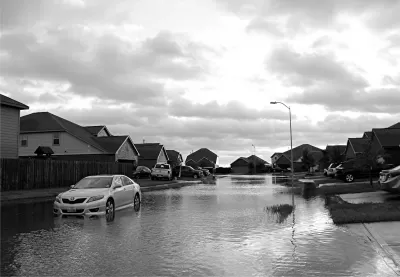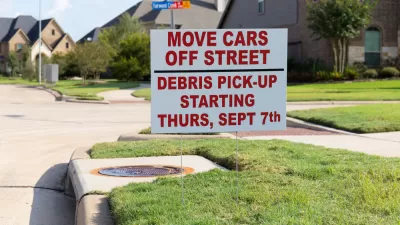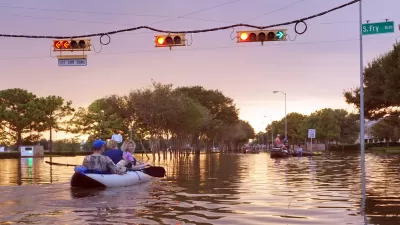Disaster recovery in the Houston area has been inconsistent, with low-income residents of color continuing to struggle to put their lives and communities back together.

Doris Brown and Ben Hirsch report on a research project looking at the experience of Hurricane Harvey survivors and the reasons low-income communities of color have recovered much more slowly than other parts of the Houston area. "Considering the perspectives of poor people and people of color who have lived through natural disasters means we have to discard the understanding that disasters happen at one moment in time and recovery begins immediately."
They point to insufficient government aid and recovery resources as one reason these communities are slow to recover. "Current home repair assistance eligibility standards — which exclude people for having houses in heirship, tax debt, not being able to afford flood insurance and deferred maintenance — are a clear example of how viewing disasters as events that take place at one moment amplifies inequality and the racial wealth gap."
Brown and Hirsch say the research findings also suggest that local evacuation centers in these communities and more investment in disaster preparedness would help with recovery. In addition, cash payments, a streamlined application process, and more funding for community-based groups would help decrease the racial disparities in disaster recovery.
FULL STORY: 5 ways to help take racism out of disaster recovery

Planetizen Federal Action Tracker
A weekly monitor of how Trump’s orders and actions are impacting planners and planning in America.

Chicago’s Ghost Rails
Just beneath the surface of the modern city lie the remnants of its expansive early 20th-century streetcar system.

San Antonio and Austin are Fusing Into one Massive Megaregion
The region spanning the two central Texas cities is growing fast, posing challenges for local infrastructure and water supplies.

Since Zion's Shuttles Went Electric “The Smog is Gone”
Visitors to Zion National Park can enjoy the canyon via the nation’s first fully electric park shuttle system.

Trump Distributing DOT Safety Funds at 1/10 Rate of Biden
Funds for Safe Streets and other transportation safety and equity programs are being held up by administrative reviews and conflicts with the Trump administration’s priorities.

German Cities Subsidize Taxis for Women Amid Wave of Violence
Free or low-cost taxi rides can help women navigate cities more safely, but critics say the programs don't address the root causes of violence against women.
Urban Design for Planners 1: Software Tools
This six-course series explores essential urban design concepts using open source software and equips planners with the tools they need to participate fully in the urban design process.
Planning for Universal Design
Learn the tools for implementing Universal Design in planning regulations.
planning NEXT
Appalachian Highlands Housing Partners
Mpact (founded as Rail~Volution)
City of Camden Redevelopment Agency
City of Astoria
City of Portland
City of Laramie





























